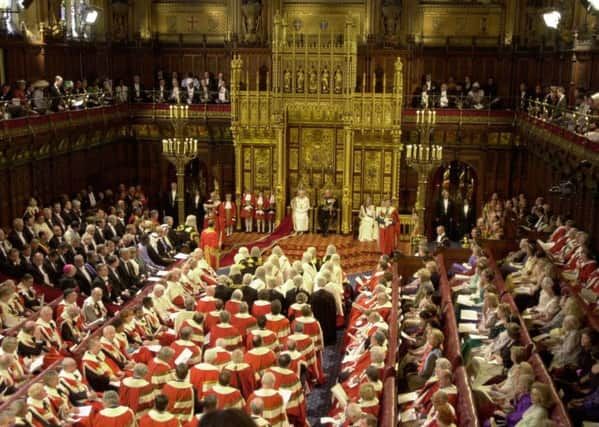Leaders: Lords overstepped mark once too often


A bold stand against the government’s tax credit reforms the House of Lords’ opposition may well be. But a shining example of representative democracy it is certainly not. Few would deny that Chancellor George Osborne’s latest attempt at welfare reform is controversial, or that the House of Lords should have a strong voice on a change that will penalise many low-income working households.
But the Lords’ outright opposition to this latest attempt at welfare reform has moved in short order from a political row to a constitutional stand-off between the two houses. To defy the wishes of the majority party in the Commons tasked with bringing down a chronic budget deficit defies a long standing parliamentary agreement that the Lords should not frustrate a finance bill put before it by the Commons.
Advertisement
Hide AdAdvertisement
Hide AdUnder the Parliament Act 104 years ago – passed after the Lords defied Lloyd George’s 1909 People’s Budget – the convention has been that the Lords could no longer use its power to oppose the Commons on tax and financial matters. Without this restriction, reforming budgets could be blocked by an unelected and unrepresentative assembly biased towards landholding and commercial interests.
This restriction was championed by a Liberal administration. The current manoeuvre by the Liberal Democrats to invoke a rarely used “fatal motion” today which would scrap the proposed changes entirely smacks of party political opportunism.
This should be a time when the Lords can play an important role by persuasion and argument. But the legitimacy of the second chamber is now on shaky ground. Despite the explosive growth of its membership in recent years, it stands no higher in popular esteem – indeed, it is arguably even more lacking in public support.
This is all the more regrettable considering the valuable work the Lords has historically undertaken in its scrutiny of parliamentary legislation and the knowledge, skills and experience it has brought to bear on many hastily prepared bills sent to it from the Commons.
Today’s Upper House has been filled with elderly peers, bishops and a random assortment of political has-beens. Recent scandals have confirmed a widespread view among the public that many are milking the system to their personal advantage or simply clocking in to collect their £300-a-day allowance.
With 781 members entitled to vote, it now enjoys the dubious title of the world’s largest legislative chamber outside China. Indeed China’s premier Li Keqiang could have been forgiven a wry smile on his visit to Britain last week over lectures about this country’s superior form of democracy.
The government now needs to act on two fronts. First, it can use the limited time left to it to take some of the sting out of the proposed tax changes. This could be done by modifying the impact on the worst affected families as veteran welfare reformer Frank Field has suggested, or phasing in the changes.
And second, it now surely time that it acts on the House of Lords and pushes through long-overdue reform. It has become far too big for its non-elected boots.
Yes to equality – and to flexibility
Advertisement
Hide AdAdvertisement
Hide AdWe have arrived at a big moment for women in the workplace – at last. It is 45 years since the Equal Pay Act was meant to herald an end to the gender pay gap. Now, after years of campaigning, Prime Minister David Cameron is set to bring forward rules to make firms with more than 250 workers reveal whether they pay men more than women.
Mr Cameron will also announce an ambition to end the gender pay gap within a generation. It currently stands at just over 19 per cent for full- and part-time workers in the UK, meaning a woman on average earns around 80p for every £1 earned by a man. Other steps include a target to include women on the boards of all the UK’s top 350 companies.
These moves should be widely welcomed – all the more so given the growing numbers of female graduates and skilled personnel coming into the labour force. Pay discrimination on the grounds of gender has come to look ever more anachronistic – and blatantly unfair.
However, legislation needs to guard against unplanned and unwanted barriers to female employment. When overall costs are taken into account, employers have to provide for periods of maternity leave. Many occupations now require long hours that can be particularly punishing for women with responsibilities for young children. There is also a need for employers to be flexible and accommodating for female staff who have maternal responsibilities.
This is no argument for pay discrimination. But employers may argue that the overall costs and obligations in hiring female staff are greater than those incurred by hiring men. This objection could be readily overcome by the acceptance by both sides of the need for flexibility – a growing requirement of today’s fast-changing work environment.